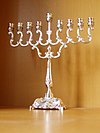Maccabean Revolt
| Template:Wikify is deprecated. Please use a more specific cleanup template as listed in the documentation. |
| Revolt of the Maccabees | |||||||||
|---|---|---|---|---|---|---|---|---|---|
| File:Hasmonean-map.jpg The Hasmonean Kingdom | |||||||||
| |||||||||
| Belligerents | |||||||||
| Jews of Judea | Seleucid Empire | ||||||||
| Commanders and leaders | |||||||||
| Mattathias, Judah Maccabee, Jonathan Maccabeus |
Antiochus IV Epiphanes Lysias Gorgias Nicanor | ||||||||
Background
When Antiochus Epiphanes (ca. 215–164 BC), became ruler of the Seleucid Empire in 175 BC, a Hellenizing party had been long-established in Judea. They built a gymnasium, competed internationally in Greek games, "removed their marks of circumcision and repudiated the holy covenant". (1 Maccabees, i, 15).
The High Priest in Jerususalem was Onias III. His brother Jason, who was pro-Syrian, bribed Antiochus to make him High Priest instead. Antiochus was insensitive to the views of religious Jews and treated the High Priest as a political appointee.
Menelaus, who was not even a member of the High-priestly family, then bribed Antiochus and was appointed High Priest in place of Jason. Menelaus had Onias murdered. His brother Lysimachus stole the holy vessels from the Temple. This caused riots and Lysimachus was killed. Menelaus was arraigned before Antiochus but bribed his way out of trouble. Jason subsequently drove out Menelaus and became High priest again. Antiochus was incensed at the overthrow of his appointee, Menelaus, sacked the Temple and re-installed Menelaus.[1]
From this point onwards Antiochus pursued a Hellenizing policy with zeal. In 167 BC Jewish sacrifice was forbidden, sabbaths and feasts were banned and circumcision was outlawed. Heathen altars were set up and unclean animals sacrificed on them. The Olympian Zeus was placed on the altar of the Temple. Possession of Jewish scriptures was made a capital offence.
The Revolt
After Antiochus issued his decrees forbidding Jewish religious practice, a rural Jewish priest from Modiin, Mattathias the Hasmonean, sparked the revolt against the Seleucid Empire by refusing to worship the Greek gods. Mattathias slew a Hellenistic Jew who stepped forward to offer a sacrifice to an idol in Mattathias' place. He and his five sons fled to the wilderness of Judea. After Mattathias' death about one year later, his son Judah Maccabee led an army of Jewish dissidents to victory over the Seleucid dynasty. The term Maccabees as used to describe the Judean's army is taken from its actual use as Judah's surname.
The revolt itself involved many individual battles, in which the Maccabean forces gained infamy among the Syrian army for their use of guerrilla tactics. After the victory, the Maccabees entered Jerusalem in triumph and ritually cleansed the Temple, reestablishing traditional Jewish worship there and installing Jonathan Maccabee as high priest. A large Syrian army was sent to quash the revolt, but returned to Syria on the death of Antiochus IV. Its commander Lysias, preoccupied with internal Syrian affairs, agreed to a political compromise that provided religious freedom.
Following the re-dedication of the temple, the supporters of the Maccabees were divided over the question of whether to continue fighting. When the revolt began under the leadership of Mattathias, it was seen as a war for religious freedom to end the oppression of the Seleucids. However, as Maccabees realized how successful they had been many wanted to continue the revolt as a war of national self-determination. This conflict led to the exacerbation of the divide between the Pharisees and Sadducees under later Hasmonean monarchs such as Alexander Jannaeus. [2]
Judah Maccabee led those who sought the continuation of the war of national identity. On his death in battle in 160 BC, his younger brother, Jonathan, who was already High Priest, succeeded Judah as army commander. Jonathan made treaties with various foreign states, causing further dissent among those who desired religious freedom over political power. On Jonathan's death in 142 BC, Simon Maccabee, the last remaining son of Mattathias, took power. That same year, Demetrius II, king of Syria, granted the Jews complete political independence and Simon, great high priest and commander of the Jews, went on to found the Hasmonean dynasty. Jewish autonomy lasted until 63 BC, when the Roman general Pompey captured Jerusalem and subjected Judea to Roman rule, while the Hasmonean dynasty itself ended in 37 BC when the Idumean Herod the Great became de facto king of Jerusalem.
Every year Jews celebrate Hanukkah in commemoration of Judah Maccabee's victory over the Seleucids and subsequent miracles.
Mention in Deuterocanon
The story of the Maccabees can be found in the Catholic and Orthodox Bibles in the deuterocanonical books of 1 Maccabees and 2 Maccabees. Books of 3 Maccabees and 4 Maccabees are not directly related to the Maccabees.

